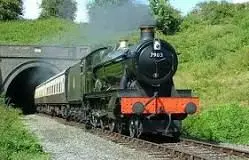Gloucestershire Warwickshire Railway - Toddington
Over 100 views on venues4hire.org

Gloucestershire Warwickshire Railway - Gloucestershire Warwickshire Railway
To make a booking or enquire about hiring this venue please use the contact details below - Please mention Venues for Hire
01242 621405
Bookings Administrator
Use contact form below
Gloucestershire Warwickshire Railway description
Commercial Venue
Medium (1-150)
The Cotswolds is the Anglo-Saxon name for the range of hills that runs from the South Midlands to Bath and from the Vale of Evesham to Oxford. They are so named because sheep (cote) ranged freely in huge numbers over the uncultivated open land (wolds). Cotswold stone is oolitic limestone (stone containing an aggregate of small round granules). It is used to build the dry stone walls that surround fields in this area, and many of the houses in the local villages, giving them a very distinctive and attractive appearance.
The Cotswolds lie mainly in Gloucestershire, and end abruptly in a steep escarpment on the southern and western slopes, producing the steep hill that overlooks the Severn Valley, and the long steep run down into Bath. The hills fall very gently on the eastern side, so that when approaching from Oxford you hardly realise that you are going up hill. The Cotswolds rise to over 1,000 feet above sea level (300 metres) at Cleeve Cloud, which is the highest point south of the Pennines.
Many of the sheep that roamed on the hills were owned by the local Abbeys, which brought the monks enormous wealth, as wool was the most important trade in the 14th century. Wool merchants built large churches in the district to thank God for their prosperity. These are known as "Wool churches", and the Parish Churches at Cirencester, Northleach and Chipping Camden are typical examples of them. Some villages take their name from the hills, like Stow-on-the-Wold, which was named in Roman times and means 'Holy place on the hill'. The long-woolled sheep were called the Cotswold Lions, but only one flock of these still exists, at Aldsworth.
Many important rivers rise in the Cotswolds, like the Bristol Avon and the River Thames, the source of which is at Seven Springs, near Cheltenham. Within the Cotswold area there are sandy beds from which flows the soft water that was used to wash the wool. Mills were built to process the wool, especially in the Stroud area. During treatment the wool was hung out on tenterhooks to be stretched while it dried, which gives the derivation of our word for stretched nerves. Fuller's earth is also found in the district, and this was used for cleaning the wool.
Ancient tribes lived on the hills as it was less dangerous than in the valleys, and one famous burial ground in the Cotswolds is Belas Knap, near Winchcombe. Also near Winchcombe are the Huddlestone's Table rocks, where the Saxon King Kenulf bade farewell to his guests after the dedication of the nunnery that he founded in Winchcombe.
The main trees in the area are beech, for example in Cranham woods, but there are also maple, hazel and other varieties. Orchards were planted on the gentler slopes as cold air sinks, leaving the fruit trees frost-free.
The Cotswolds lie mainly in Gloucestershire, and end abruptly in a steep escarpment on the southern and western slopes, producing the steep hill that overlooks the Severn Valley, and the long steep run down into Bath. The hills fall very gently on the eastern side, so that when approaching from Oxford you hardly realise that you are going up hill. The Cotswolds rise to over 1,000 feet above sea level (300 metres) at Cleeve Cloud, which is the highest point south of the Pennines.
Many of the sheep that roamed on the hills were owned by the local Abbeys, which brought the monks enormous wealth, as wool was the most important trade in the 14th century. Wool merchants built large churches in the district to thank God for their prosperity. These are known as "Wool churches", and the Parish Churches at Cirencester, Northleach and Chipping Camden are typical examples of them. Some villages take their name from the hills, like Stow-on-the-Wold, which was named in Roman times and means 'Holy place on the hill'. The long-woolled sheep were called the Cotswold Lions, but only one flock of these still exists, at Aldsworth.
Many important rivers rise in the Cotswolds, like the Bristol Avon and the River Thames, the source of which is at Seven Springs, near Cheltenham. Within the Cotswold area there are sandy beds from which flows the soft water that was used to wash the wool. Mills were built to process the wool, especially in the Stroud area. During treatment the wool was hung out on tenterhooks to be stretched while it dried, which gives the derivation of our word for stretched nerves. Fuller's earth is also found in the district, and this was used for cleaning the wool.
Ancient tribes lived on the hills as it was less dangerous than in the valleys, and one famous burial ground in the Cotswolds is Belas Knap, near Winchcombe. Also near Winchcombe are the Huddlestone's Table rocks, where the Saxon King Kenulf bade farewell to his guests after the dedication of the nunnery that he founded in Winchcombe.
The main trees in the area are beech, for example in Cranham woods, but there are also maple, hazel and other varieties. Orchards were planted on the gentler slopes as cold air sinks, leaving the fruit trees frost-free.
Venue suitability
This venue is suitable for the following uses:
Venue facilities
Other venue facilities
We don't currently hold any detailed information about the rooms at this Venue.
If this is your Venue or Hall please use the Adopt link on the right to add more detailed information about this Venue.
If you wish to hire this Venue or Hall please use the contact details on the overview tab.
Please encourage every Venue to take a few minutes to 'Adopt' their listing and add unique content and photos.
